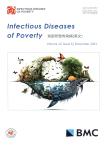The impact of poverty on dog ownership and access to canine rabies vaccination:results from a knowledge,attitudes and practices survey,Uganda 2013
作者机构:United States Centers for Disease Control and PreventionAtlantaGAUSA Uganda Virus Research InstituteKampalaUganda Veterinary Public Health DivisionMinistry of HealthKampalaUganda World Health OrganizationKampalaUganda
出 版 物:《Infectious Diseases of Poverty》 (贫困所致传染病(英文))
年 卷 期:2017年第6卷第1期
页 面:859-880页
核心收录:
学科分类:1004[医学-公共卫生与预防医学(可授医学、理学学位)] 1002[医学-临床医学] 1001[医学-基础医学(可授医学、理学学位)] 100401[医学-流行病与卫生统计学] 10[医学]
基 金:This study was conducting with USAID funding.The funding agency had no role in study design analysis or interpretation of the data
主 题:Rabies Dogs Vaccination Poverty Low-income Neglected Africa
摘 要:Background:Rabies is a neglected disease despite being responsible for more human deaths than any other zoonosis.A lack of adequate human and dog surveillance,resulting in low prioritization,is often blamed for this *** methods are often employed to describe the rabies burden when surveillance data are not available,however these figures are rarely based on country-specific ***:In 2013 a knowledge,attitudes,and practices survey was conducted in Uganda to understand dog population,rabies vaccination,and human rabies risk factors and improve in-country and regional rabies burden *** and multi-level logistic regression techniques were conducted to estimate the total dog population and vaccination ***:Twenty-four villages were selected,of which 798 households completed the survey,representing 4375 *** owning households represented 12.9%of the population,for which 175 dogs were owned(25 people per dog).A history of vaccination was reported in 55.6%of owned *** and human population density highly correlated with dog ownership,and when accounted for in multi-level regression models,the human to dog ratio fell to 47:1 and the estimated national canine-rabies vaccination coverage fell to 36.1%.This study estimates there are 729486 owned dogs in Uganda(95%CI:719919-739053).Ten percent of survey respondents provided care to dogs they did not own,however unowned dog populations were not enumerated in this estimate.89.8%of Uganda’s human population was estimated to reside in a community that can support enzootic canine rabies ***:This study is the first to comprehensively evaluate the effect of poverty on dog ownership in *** results indicate that describing a dog population may not be as simple as applying a human:dog ratio,and factors such as poverty are likely to heavily influence dog ownership and vaccination *** modelled estimates should be confirmed through further f



